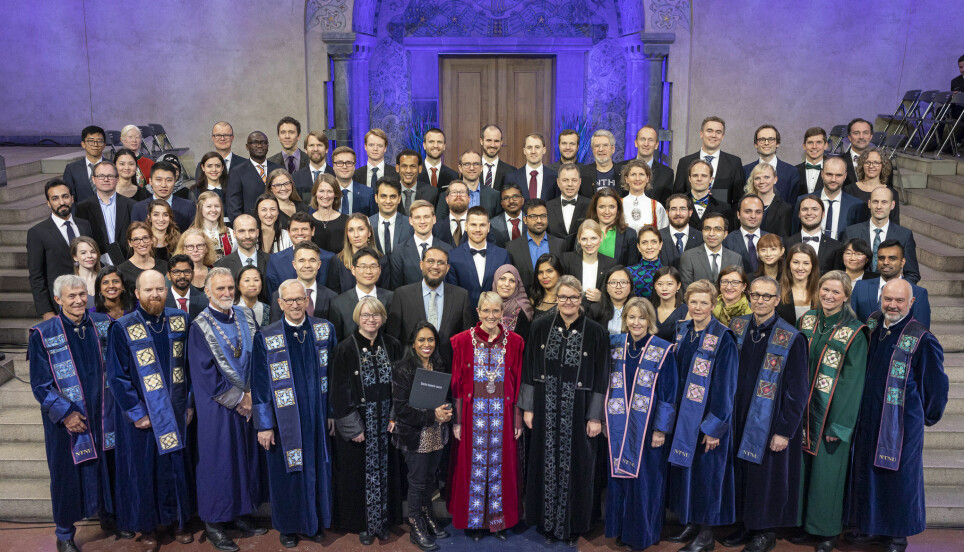
Huge increase in international students doing their PhD in Norway
40 per cent of the people who get doctorates in Norway are foreign citizens. Half of them leave when they are done. Is Norway investing in lost knowledge?
The trend is particularly worrisome within natural sciences and technical disciplines, according to an article in the magazine Forskningspolitikk, ‘Science Policy’ in English.
In 2018, two thirds of the doctoral candidates within these fields of study were foreign citizens.
The Nordic Institute for Studies in Innovation, Research and Education, NIFU, have counted foreign students since the 1990s. Back then, between 1990-1999, foreign PhD students amounted to 11 per cent of the total.
In 2018 this same number had quadrupled to 42 per cent.
Young men studying the natural sciences
But who comes to Norway? And why do they leave? A recent NIFU-report has looked into this. The study is not representative, but a few findings are listed in Forskningspolitikk:
- 70 per cent of them are men.
- They are younger than the average Norwegian PhD-student, and most often single and childless.
- Those who leave do so rather quickly after completing their PhDs. This suggests that the decision to leave was already made. Very few stay in Norway for a brief period and then leave.
- A majority of those who leave have doctorates within mathematics and natural sciences from the Norwegian University of Science and Technology (NTNU)
- The main reason for leaving is that there are better opportunities for jobs and careers abroad.
- The second big reason for leaving is a wish to return to the home country and family.
- Those who move on to the USA or other European countries, are mainly chasing jobs and career opportunities. Those who move to Africa or Asia are motivated by a wish to return home.
Should they stay or should they go?
Norway may appear as an attractive destination for foreigners wishing to do a PhD, as this is a paid position in the Norwegian system. However, other countries also have many students from abroad among their PhDs, for instance the UK and the US.
According to Jannecke Wiers-Jensen, the topic is politically sensitive in Norway. Wiers-Jensen studies international student mobility at OsloMet and NIFU.
She says that while for instance Canada has a clear policy on welcoming so-called skilled migration, Norway’s policy on this is unclear.
“On one hand, you might wish to keep the competency that you’ve invested in. On the other hand, facilitating so that students and PhDs can continue working in Norway after graduation may come into conflict with immigration policies and goals of not contributing to brain drains from countries who need these competencies themselves”, she says to Forskningspolitikk.
Losing out on highly qualified people
Director of NTNU Digital, Torbjørn Svendsen, is among those who are worried that too many of the Phd-students are foreign, and that so many of them leave. He believes many of them come to Norway partly because the salaries for doing doctorates in Norway are among the highest in the world.
“These are clever people. Some want to do their doctorate where they get paid the best. Then they want the job that pays the best – and since these are not necessarily available in Norway, it’s natural that many of them leave for other countries”, he says to Forskningspolitikk.
Svendsen worries that Norway will be left without necessary expertise, for instance within cyber security.
Collaborations and possible returns
The NIFU-study shows that among half of the PhD-students who move abroad after completing their doctorate in Norway, continue to work within Academia. For those who stay in Norway, the same is true only for a third.
The study also shows that knowledge doesn’t necessarily just disappear from Norway, even if the students move.
More than half of them have cooperated with Norwegian research environments on publishing articles, and one out of four are actively involved in projects with Norwegian colleagues.
The NIFU-researchers also asked if those who have left Norway would consider coming back. More than half answer that they would.
“Their research careers are definitely important to them, but the high quality of life in Norway is the main reason for wishing to come back”, says Rune Borgan Reiling from NIFU to Forskningspolitikk.
“Norway is a safe and well-functioning country, and that is valuable to most people.”
































